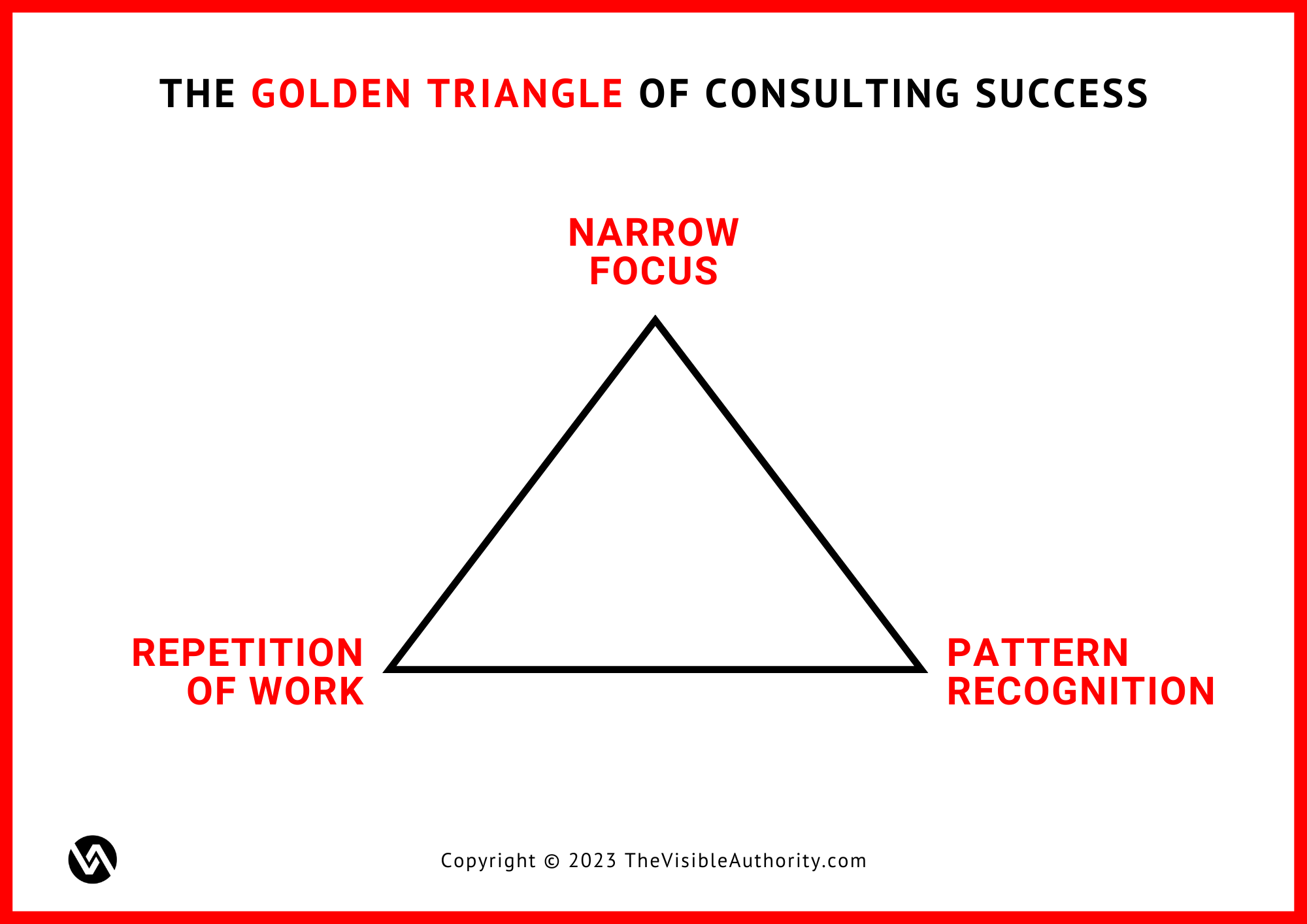
The Golden Triangle of Success High-Performing Boutique Consultancies Swear By
.jpg?width=56&name=francescorizzato8%20(1280px).jpg)
In the last few years, I’ve had a chance to audit dozens of consulting firms – primarily small and medium-sized consultancies.
No matter how often I see it, one of the observations that still amazes me is the variation in gross margins between high-performing boutique consultancies and the average, growing-on-paper-in-terms-of-revenue firms.
I’ve audited consultancies that boasted gross margins as high as 80% (!!) and worked with firms that post 20-25% gross margins.
I always use my work with highly successful consultancies as a learning opportunity – I pay close attention to identifying factors that differentiate them from struggling firms. What do they do differently?
I aggregate these learnings to spot patterns. While, of course, there are unique characteristics that contribute to the success of these consulting firms, the foundational elements, by and large, are strikingly similar.
The golden triangle of consultancy success
At the foundation of their business success, high-performing consultancies are excelling in the following three aspects:
- Narrow focus
- Repetition of similar projects
- Pattern recognition

I’ll elaborate on each briefly.
1. A narrow focus sets out the parameters for knowledge depth
My regular readers know – I’m an avid advocate of a narrow focus in consulting. I believe that true value for clients can only be created by consultancies once they become highly knowledgeable in a specific domain.
It’s the type of knowledge depth that most other consultancies would find hard to compete with. This depth allows consultants in these firms to diagnose clients’ problems precisely and efficiently to create implementation roadmaps that perfectly fit their clients' organizational and industry contexts.
It’s the type of expertise that helps clients see tangible results – be it sustainable growth, a significant reduction in costs, exponentially faster processes, or undeniably higher profits.
This level of expertise enables consultancies to charge premium fees – 2-3x higher than their competitors. Why? Because the value of their work is exponentially higher as well.
And such expertise depth is impossible without a consultancy sticking to a narrow focus in its work – both in terms of the pain points it addresses for clients and what type of clients it works with.
Recommended reading: Why High-Performance Consultancies Are Obsessed with Specificity
2. A narrow focus enables repetition in consulting work
The second aspect high-performing consultancies excel at is repetition. Due to the narrow expertise domain focus, they continuously take on the same types of projects from clients in the same domain, accumulating hundreds of hours performing similar tasks.
This repetition allows them to (1) further deepen their expertise and (2) optimize systems and processes. There are no inefficiencies. Every client onboarding process goes off without a hitch. Every marketing campaign delivers high ROIs. Every tech stack is perfectly set up and utilized. Every consultant has a predictable pipeline of work. Every resource is planned out ahead of time.
As a result, over time, the costs go significantly down. The value of work, due to expertise getting continuously deepened, goes up over time, on the other hand. As a result, gross margins and net profits grow.
Such consultancies can avoid tying their business growth to headcount growth. Instead, they look for opportunities inside their existing narrow focus.
“But Luk, repetition is boring!”
Really? Is building an incredible depth of expertise and developing a powerhouse for business performance in a consultancy boring? Kidding me?
Variation and a scattered (horizontal) service offering in consulting rarely work. I’ve repeatedly seen consultancies saying yes to all incoming opportunities, diluting their expertise, and competing with thousands of other consultancies on pricing. These firms do not have a reputational footprint for deep expertise. Their business development and marketing campaigns yield poor results. Consultants’ time is not managed in any predictable, stable manner. The result? Sub-par margins and a constant existential health struggle.
Variation is exciting at first. I get that. But to be honest, it’s wearing off over time. Then, fatigue hits the road. The excitement of new projects, new types of clients, and acquiring new skills eventually loses ground to the frustration and stress of not having a reliable pipeline of work.
High-performing consultancies fiercely protect their narrow expertise because they know this is their differentiating factor. It’s the foundation of their success. They will never dream of diluting that.
Recommended reading: Why Variation in Consulting Does Not Sell
3. Repetition leads to pattern recognition
A consultancy business's true value is rooted in the power of pattern recognition – much like in science, research, or medical practice.
Just as a researcher discerns patterns in data, a medical specialist diagnoses conditions from symptomatic patterns, or a scientist makes discoveries from repeated experimentation, a consultancy derives differentiating expertise by undertaking similar projects repetitively.
This repetition enables consultancies to spot patterns and make accurate predictions. This is the level of expertise that average consultancies with a diversified portfolio of services will never be able to achieve.
Being able to recognize patterns allows consultancies to spot symptoms and provide a diagnosis to their clients with laser-like precision. This, in turn, enables these consulting firms to create a perfect “treatment” – a roadmap that will lead their clients from a pain-ridden state to the “promised land”.
These implementation plans deliver on the promises – they allow clients to see significant changes for the better. This is how these boutique consultancies grow their reputation footprint – they have case studies, benchmarks and referrals that point to the unmatched expertise that allows them to deliver results that very few other consultancies in that domain can compete with.
Result? Prospects start knocking on their door. Business development and sales costs become negligent. Marketing is focused on amplifying the reputational footprint of the consultancy and its owners/partners.
I’ve learned in the past decade that high-performing consultancies can much better escape the stress of always hunting for new clients and competing based on pricing through specificity – by focusing on a specific area of expertise that will have a narrowly defined audience solve a high-impact (expensive) problem.
Recommended reading: Why High-Performance Consultancies Are Obsessed with Specificity
In conclusion
The golden triangle – narrow focus, repetition, and pattern recognition – acts as a catalyst, turning ‘raw expertise’ into invaluable insights, elevating the consultancy’s efficiency, reducing the variability in processes and improving the predictability of outcomes.
Needless to say, this ‘boring triangle’ offers unique perspectives, data, benchmarks, and evidence-based, differentiating advice to clients.
Clients love that.
I urge consultancies still in the old-school world of offering many services to think again! The golden triangle should become every boutique consultancy’s ambition.
Because I’ve witnessed it repeatedly: it ALWAYS leads to higher client satisfaction, stronger customer relationships, increased demand for services, and premium pricing.
In the end, the consultancy's bottom line and the owner’s or partner’s quality of life will be positively impacted.
Interested in receiving all my learnings to build a better consultancy?
Subscribe to my newsletter.
.jpg?width=66&name=francescorizzato8%20(1280px).jpg)
Luk’s extensive career in the consulting business, which spans more than 20 years, has seen him undertake a variety of influential positions. He served as the European CHRO for Nielsen Consulting (5,000 consultants in the EU), founded iNostix in 2008—a mid-sized analytics consultancy—and led the charge in tripling revenue post-acquisition of iNostix by Deloitte (in 2016) as a leader within the Deloitte analytics practice. His expertise in consultancy performance improvement is underlined by his former role on Nielsen's acquisition evaluation committee. After fulfilling a three-year earn-out period at Deloitte, Luk harnessed his vast experience in consultancy performance improvement and founded TVA in 2019. His advisory firm is dedicated to guiding consulting firms on their path to becoming high-performing firms, drawing from his deep well of consulting industry expertise and financial acumen.

